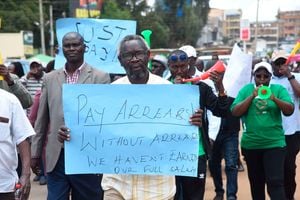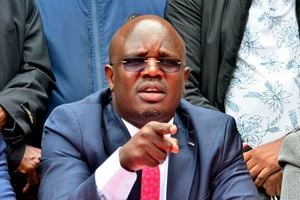
Stranded travellers await clearance at JKIA Terminal 1A with Kenya Aviation Workers on strike on September 11, 2024.
As President William Ruto marks two years in office today, his administration is fighting protests and workers’ strikes that threaten his hold on power.
Lives have been lost, property destroyed and public services paralysed as Kenya becomes a country of chaos and protests.
At the heart of what is becoming the new normal for the Kenya Kwanza administration has been a sustained backlash by citizens against controversial taxes and questionable policies by the regime.
From Gen Z-led anti-tax demonstrations to strikes by health workers, teachers and university employees and students, Kenya has become a hotbed of protests since the August 9, 2022 elections, with 2023 and 2024 witnessing record marches.
The government has faced pressure to drop controversial tax proposals, reduce the high cost of living and address the welfare of workers by implementing Collective Bargaining Agreements (CBAs).
Nairobi, the financial hub of the East African Community and home to a key United Nations complex, has been the hotspot of the struggles, which were instigated by the opposition in 2023.
The protests dragged on into 2024 when the Gen Z took over, before spreading to other sectors.
On Thursday this week, Nairobi was turned into a battleground as traders at Marikiti and Muthurwa markets demonstrated against the decision by the devolved government to move them to Kangundo Road Market. The traders lit fires and blocked some of the capital’s main roads, paralysing business.
It was the aviation workers’ turn to paralyse operations at Jomo Kenyatta International Airport (JKIA), Moi International Airport in Mombasa, Kisumu International Airport and Eldoret Airport on Wednesday.
The employees were protesting the proposal by the government to lease JKIA, East Africa’s busiest transport hub, to Indian conglomerate Adani.
The Indian firm submitted a proposal to the Kenya Airports Authority early in the year to operate JKIA for 30 years.
Airport staff say the agreement is shrouded in mystery as they have never been involved in the plan.
“The government has not been honest in the negotiations. It has not provided the documents we asked for. All we want is stopping this Adani deal,” said Kenya Aviation Workers Union Secretary-General Moses Ndiema.
The JKIA shutdown, which was resolved by Roads and Transport CS Davis Chirchir and Central Organisation of Trade Unions Secretary-General Francis Atwoli, left thousands of passengers stranded.
The Fresh Produce Exporters Association of Kenya estimated that its members lost Sh410 million in the disruption.The Kenya Association of Travel Agents said losses from ticket sales hit Sh2 million.
The aviation workers took the baton from university students who protested the new funding model. The model has been the subject of controversy since its introduction in May 2023.
The model aims to allocate government support based on individual student needs, rather than block funding.
Students say the Means Testing Instrument (MTI) is riddled with inaccuracies. They are also calling for the interest rate on loans to be reduced.
“We were not involved in the formulation of this model. It is time they invite us to the committee table,” Kenyatta University student leader Boniface Ododa said.
“We wouldn’t have reached this point without the new model,” added Kabarak University student leader Evans Serem.
Some public university lecturers took to the streets last week demanding salary arrears and the transfer of Sh4.1 billion monthly dues to third parties.
The academic staff have complained of overdue salary increase, delays in pay and non-remittance of statutory and third party deductions.
There’ll be no teaching and learning until we get the arrears and the monthly deductions remitted to a third party,” said Dr Richard Okero, chairman of the Universities Academic Staff Union (Uasu) Moi University Chapter.
A nationwide strike by the 35 public universities dons begins next week after Uasu issued a seven-day notice on Thursday.
Uasu cited delays in the payment of full salaries and the collapse of negotiations on the 2021-25 CBA as reasons for the strike.
Uasu issued the notice jointly with the Kenya Universities Staff Union (Kusu). The unions expressed frustration at failure by the government to address their concerns.
They said while other civil servants have enjoyed salary and allowance adjustments since 2021, university workers have been left out. Uasu Secretary-General Constantine Wasonga said 30,000 university workers would withdraw their labour from Wednesday if their demands would not have been met.
The planned strike raises questions about the sustainability of the higher education funding model and the ability of public universities to meet their financial obligations.
The latest development follows strikes by the Kenya Civil Service Union and the Kenya Union of Post Primary Education Teachers (Kuppet) over failure by the government to implement CBAs.
The Kenya National Union of Teachers (Knut) called off its planned strike after talks with the Teachers Service Commission.
Civil servants had also threatened to boycott work at the end of the month, accusing their employer of lacking commitment to honour the second phase of their CBA, which covers July 1, 2024 to June 30, 2025.
The second phase was delayed, with the government citing lack of money. Public Service Cabinet Secretary Justin Muturi averted the strike when he said the National Treasury would release Sh1.5 billion for the second phase of the CBA.
No sooner had that boycott by civil servants been averted than county government employees issued a 21-day strike notice over delayed salary increases.
Young Kenyans took to the streets to demand the withdrawal of the Finance Bill, 2024, which included tax increases. They also cited opulence by top government functionaries.
The Generation Zs demanded that President Ruto ensures greater accountability and good governance. The anti-government protests began on June 18 and continued into early July with calls for President Ruto to step down.
The height of the protests was the invasion of Parliament by groups of demonstrators on June 25, resulting in deaths, injuries and destruction of property.
At least 60 Kenyans were killed and hundreds injured.
Dr Ruto withdrew the Finance Bill, sent the entire Cabinet home and promised reforms. However, the protests resumed in mid-July following the reappointment of many of the ministers.
A cornered President Ruto made concessions and reached out to opposition leader Raila Odinga to form what they called a broad-based government.
The protests have resulted in abductions and killing of demonstrators. Some have been taken from their homes, work and public spaces by people believed to be police officers.
Government spokesman Isaac Mwaura said Kenya had lost at least Sh6 billion due to the protests.
“We cannot forget the businesses that lost billions of shillings. We empathise with them,” Mr Mwaura said on July 18.
But these recent strikes followed one by doctors that began on March 13 and lasted for 56 days. The doctors were demanding the full implementation of their CBA signed in 2017 and the posting of junior doctors. As doctors were on the streets, nurses and lab technicians walked out of hospitals.
There was a strike by teaching interns too. Last year, the opposition called strikes that led to at least 23 people dead and dozens injured.







